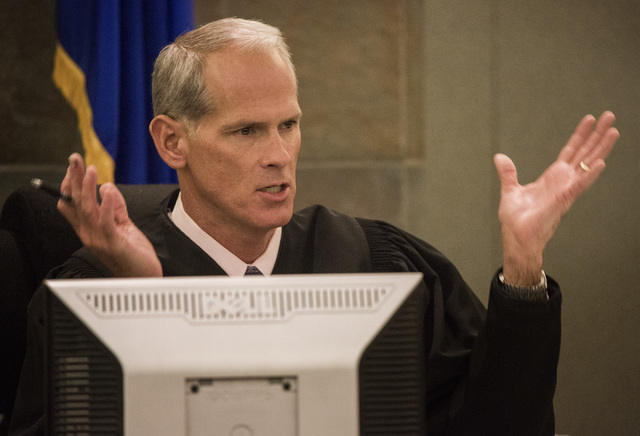Judge: Uber ride sharing can roll on, for now

The controversial ride-sharing company Uber won a court victory Wednesday in Las Vegas, but its legal battles in Nevada are far from over.
During a hearing in his packed courtroom, District Judge Douglas Herndon heard arguments from lawyers before refusing to grant a restraining order that would have temporarily barred the company from operating in Clark County.
“I think competition in business is a great thing,” the judge said.
Herndon said lawyers with the Nevada attorney general’s office failed to show that Uber was causing irreparable harm. He then scheduled a Nov. 14 hearing on the office’s motion for a preliminary injunction.
Judges in Washoe County and Carson City already have granted temporary restraining orders against the San Francisco-based company, which launched its service in Nevada on Friday.
Uber attorney Donald Campbell said the company’s representatives “had no opportunity to be heard” before the northern judges signed the orders.
“Our position is that they are void,” he said.
In support of his argument for a restraining order in Clark County, Senior Deputy Attorney General David Newton said the Legislature has determined that passenger-transportation-for-hire needs to be regulated, but Uber drivers fail to comply with safety requirements that apply to cabdrivers.
“The threat to public safety exists now,” Newton argued.
The lawyer said 15 vehicles have been impounded, and one Uber driver, who had a permit to carry a concealed weapon, was in possession of a firearm. He also said Uber drivers outside Nevada have been accused of committing violent acts on their passengers.
But Herndon, a former prosecutor, said cabdrivers also have been accused of committing violent crimes.
“No amount of screening is necessarily going to find every psychopath,” the judge said.
Herndon said agents with the Nevada Taxicab Authority and the Nevada Transportation Authority may continue citing drivers they suspect are violating the law.
When Uber began offering its service in Nevada, it immediately met resistance from the state’s Department of Business and Industry, which oversees the state’s taxicab and transportation authorities.
Enforcement officers from both agencies cited drivers for providing an “unlicensed for-hire transportation service” and impounded their vehicles. The company responded by vowing to back its contracted drivers and providing rental cars for them until vehicles were freed from impound. Drivers can be fined up to $10,000 per incident.
At Wednesday’s court hearing, Campbell argued that gun-toting agents wearing ski masks and bulletproof vests have been scaring drivers, passengers and spectators.
“They’re basically providing muscle for the taxicab industry, and that is not their job,” the lawyer argued.
He predicted someone will get hurt if “these little junior G-men” continue to pull over Uber drivers and search their vehicles.
“That is a public safety issue, but it’s not our creation. It’s their creation,” Campbell said.
The attorney also argued that Uber drivers are saving lives by, in some instances, providing transportation to drunken drivers in areas that are not served by taxicabs.
Uber, which connects riders with drivers through a mobile device application, began in 2009 and now operates in more than 200 cities worldwide.
Outside Herndon’s courtroom Wednesday, Uber spokeswoman Eva Behrend said the company stands by all its drivers.
“We will continue to be there every step of the way,” she said.
Beyond Herndon’s ruling, Uber executives had another reason to celebrate.
On a Wednesday conference call, David Plouffe, senior vice president for policy and strategy for Uber, hailed “groundbreaking” legislation in the District of Columbia that enables Uber’s contracted drivers to operate in the same environment as taxidrivers.
The district’s council on Tuesday voted 12-1 to approve new ride-sharing legislation that can be duplicated in other cities and states, including Nevada, he said.
The District of Columbia joins 13 cities and states that have have approved laws in the past six months that allow Uber to operate legally.
Before the D.C. vote, new ordinances were approved in Austin, Texas, and Oklahoma City in October. New laws, rules and regulations also were approved in California and Houston in August; Tulsa, Okla., Milwaukee, Columbus, Ohio, Minneapolis and Seattle in July; Baton Rouge, La. in June; Chicago in May and Colorado in April.
Plouffe said in some cases, the regulations for ride-sharing companies are tougher than they are for cabdrivers.
Uber drivers are required to have background checks dating back seven years compared with checks back three or five years for D.C. cabdrivers.
Uber also has a $1 million liability insurance policy on its contracted drivers compared with policies of up to $50,000 on cabdrivers.
“In some cities and states, modest adjustments were made in existing regulations,” Plouffe said. “We’re not looking for no regulation, we’re looking for more modern regulation. Some of the transportation regulations written today are 70 years old.”
An update of Nevada’s transportation regulations was approved in 1997.
Contact reporter Carri Geer Thevenot at cgeer@reviewjournal.com or 702-384-8710. Find her on Twitter: @CarriGeer. Contact Richard N. Velotta at rvelotta@reviewjournal.com or 702-477-3893. Find him on Twitter: @RickVelotta.